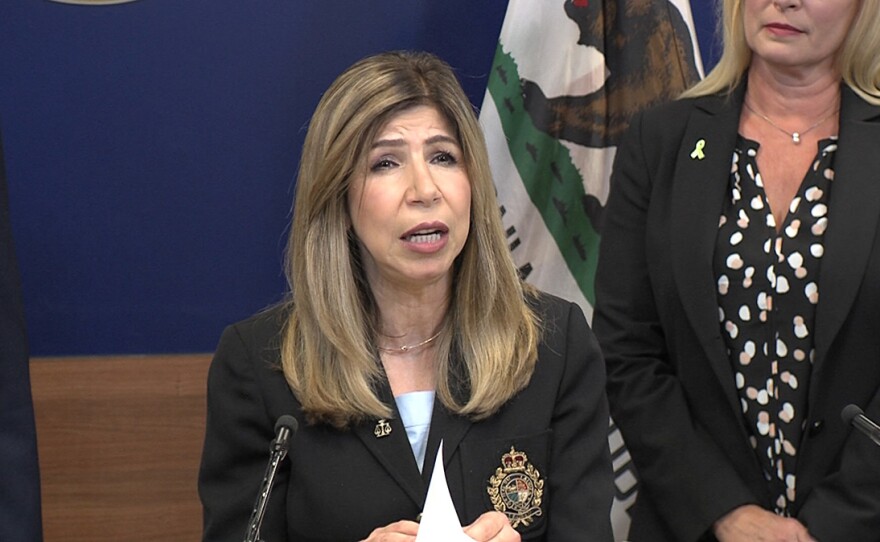San Diego prosecutors have filed petitions to lift all civil gang injunctions in San Diego County, removing about 350 names from the court orders that officials say impose burdensome barriers on individuals who have turned their lives around, it was announced Tuesday.
The injunctions are court orders prohibiting people identified as gang members from associating with other gang members or committing crimes in specific geographical areas, similar to restraining orders. The injunctions remain in effect for life unless a person on the list applies for removal and meets certain criteria, though many are unaware of how to start the process of getting their name removed, according to the San Diego County District Attorney's Office.
The DA's office, which seeks to lift 20 injunctions in place across the county, said a review of the injunction lists was undertaken in recognition of "the dated nature of most of the injunctions and the potential problems that being on the list pose to those who are no longer affiliated with a gang or engaging in criminal activity."
So far, a San Diego judge has signed orders dissolving four of the injunctions, while a Vista judge has signed off on dissolving another three. Another 13 await judicial approval and/or signatures.
The San Diego City Attorney's Office also filed petitions, resulting in two injunctions dissolved in the city of San Diego earlier this month. City Attorney Mara Elliott said her office began working with the San Diego Police Department to remove the names of people "who no longer posed a public safety threat."
The actions will remove 349 people's names from the lists, according to the DA's office, which said the petitions follow the removal of 332 people from injunction lists in 2019 and around 100 others in 2020. The DA's office, which says it reviewed individuals for lack of recent criminal or gang activity, will be sending letters out to inform those whose names have been removed.
The injunctions were filed across the county by prior prosecutorial administrations; none have been filed in the past eight years.
"In listening to the communities we serve, I heard concern for the violence and harm that criminal organized gangs cause, but also that families are looking for more opportunities for healthy reentry for those who have turned their lives around," District Attorney Summer Stephan said.
"In our county, civil gang injunctions were put in place 10 to 20 years ago and for the most part had become stale, and in many cases, continue to cause hardships for people who have moved on and are trying to get a job or connect with relatives," she said. "We've worked closely with our law enforcement partners to evaluate the injunctions and determined they are not effective in protecting the public from a primarily younger group of individuals who are committing gang-related crimes in our communities."
Stephan's office said the dissolution of the injunctions was advanced with the support of the sheriff and police chiefs from cities that had at least one civil injunction in place.
San Diego Mayor Todd Gloria praised the move, which followed law enforcement reforms he announced earlier this month that included a proposal to eliminate the injunctions, which he said "are outdated, and do not serve their alleged purpose of protecting public safety."
Gloria said, "This is why I advocated to eliminate them as part of my police reform package. I'm grateful for the work of the District Attorney and City Attorney to finally remove all civil gang injunctions. It is the right thing to do and gives hundreds of San Diegans an opportunity to live without the fear a stale accusation could hurt their chances for good paying jobs, education and housing."
City Councilwoman Monica Montgomery Steppe agreed.
"Eliminating gang injunctions is a necessary step on the long road to reimagining public safety and equity in law enforcement," she said. "There are no similar injunctions for white supremacists or hate groups. Therefore, we can clearly see how gang injunctions unfairly target, harm, and potentially ruin the lives of innocent members of our Black and brown communities."
Genevieve Jones-Wright, who sits on the city's Commission on Gang Prevention and Intervention, said the removal of the injunctions "is a victory that should be celebrated," but alleged that local prosecutors were touting the injunction reforms despite prior resistance to lifting the orders.
She alleged Stephan and San Diego police Chief David Nisleit were the only dissenters when the gang commission voted in 2019 to recommend eliminating all injunctions to the San Diego City Council and accused City Attorney Mara Elliott of "continuously express(ing) her opposition" to eliminating the injunctions.
"The erasure of contributions of community members who have been working on this issue for years now — with great resistance from law enforcement and the very elected officials who are taking credit for this reform — is a slap in the face," Jones-Wright said.
"These politicians only care about being politically expedient and scoring political points," she said. "They don't care about Black and Brown lives. More importantly, they clearly don't care about fostering community trust. This is (a) case in point."







